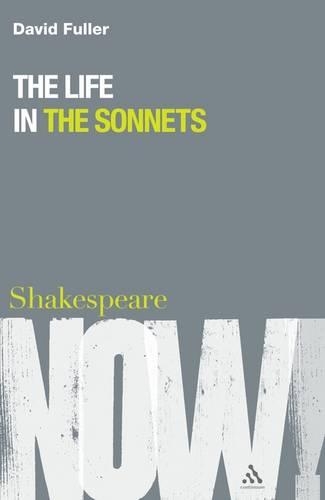
The Life in the Sonnets
(Paperback)
Available Formats
Publishing Details
The Life in the Sonnets
By (Author) Professor David Fuller
Bloomsbury Publishing PLC
Continuum International Publishing Group Ltd.
17th February 2011
United Kingdom
Classifications
Professional and Scholarly
Non Fiction
Literary studies: c 1600 to c 1800
Literary studies: poetry and poets
822.33
Physical Properties
Paperback
134
Width 128mm, Height 196mm, Spine 10mm
182g
Description
A passionately argued account of the value of experience and emotion in reading Shakespeare's sonnets and of the importance of reading poetry aloud. This book is accompanied by a companion website, featuring a complete reading of all 154 Shakespeare Sonnets.
Reviews
The ambitious project of the Shakespeare NOW series is to bridge the gap between scholarly thinking and a public audience' and public audience and scholarly thinking'. Scholars are encouraged to write in a way accessible to a general readership and readers to rise to the challenge and not be afraid of new ideas and the adventure they offer. There are other bridges the series is ambitious to cross: formal, political or theoretical boundaries' - history and philosophy, theory, and performance. * English Vol. 58 *
Reading [Shakespeare's sonnets] aloud is demonstrated to be a focused mode of criticism. ... Fuller shows the specific vocal and emotional intricacies, flexibility, intelligence, and delicacy required for an ideal rendering. The essay should become required reading for classical actors in training and voice coaches -- Richard Allen Cave * New Theatre Quarterly *
[An] exciting and unusual book . . . bold and controversial . . . a provocation, intended to dislodge us from normative expectations about critical reading, and to change . . . the way we feel towards literature, each other, and the profession of literary studies. ... [A] thrilling little book -- Sean Keilen, University of Cambridge, UK * The Cambridge Quarterly *
This is a passionate book: a book about passion in literature, passion for literature, and passion in critical writing. David Fuller reminds us of the emotional and sensual pleasures of poetry and reintroduces terms such as "enjoyment", "engagement" and "feeling" to our critical vocabularies. This book will deepen the reader's engagement not just with Shakespeare's sonnets but with all kinds of art - written, acoustic and visual - as Fuller shows us how to bring personal experience to bear on critical analysis. -- Laurie Maguire, Professor of English Literature at at Magdalen College, University of Oxford, UK
Featured in the Times Higher Education Literature Textbook round-up.
This slim and easy-to-read volumeconcludes with a brief coda that pulls things together quite nicely. -- Rudolph P. Almasy, West Virginia University * Sixteenth Century Journal *
The Life in the Sonnets . . . looks at the sonnets in a different fashion to that currently employed by the majority of critics . . . Fuller talks at length about their rhyme and metre, producing evidence to support his initial claim that these are poems that have been written to be read aloud. To add weight to his argument, Fuller talks of vocal techniques employed by both actors and opera singers. -- Arun Cheta * The Year's Work in English Studies, vol. 93 *
Author Bio
David Fuller is Emeritus Professor of English in the University of Durham, UK. From 2002 to 2007 he was the University's Orator. He trained as a musicologist, and has written on a range of literary topics from Medieval to Modern. He is the author of Blake's Heroic Argument (1988), James Joyce's 'Ulysses' (1992), Signs of Grace (with David Brown, 1995). He has edited Tamburlaine the Great (1998) for the Clarendon Press complete works of Marlowe, co-edited (with Patricia Waugh) The Arts and Sciences of Criticism (OUP, 1999), and edited Blake: Selected Poetry and Prose (Longman, 2000, 2008).
